Trudy J. Morgan-Cole's Blog, page 13
March 5, 2024
The Lies that Bind, by Emily Giffin
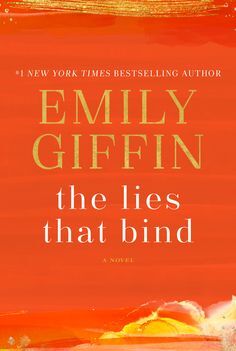
This one was kind of a so-so book for me. It’s set in New York City in the summer of 2001, when Cecily, an aspiring journalist in her late 20s, is still reeling from a breakup with Matt. Then she meets Grant in a bar and begins a whirlwind romance that doesn’t seem quite real. Is it real? Is anything about the enigmatic but nearly perfect Grant real, or is he hiding something? And then, as inevitable as the book about the eruption of Pompeii that I just read, 9/11 hits, and everything changes in unexpected ways.
I didn’t connect a whole lot with Cecily as a main character — her personality seemed a little ill-defined — and I didn’t really get invested in either Matt or Grant as romantic leads, though for much of the book Cecily is genuinely torn between them. The book is titled The Lies that Bind, so you clearly know it’s going to be a book where a lot of the plot is going to hinge on people lying to each other, but even so it’s annoying to read about plot complications that could so simply be avoided with a little basic honesty. Overall, this romance didn’t grab me as much as I’d hoped it would.
March 3, 2024
The Fake, by Zoe Whittall
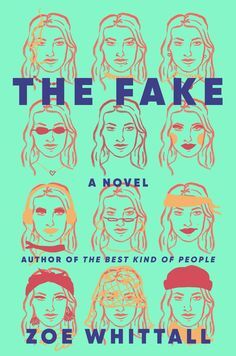
Zoe Whittall’s The Fake was a very engaging and hard-to-put down novel about two people, Shelby and Gibson, who both get scammed by the same con artist, a young woman named Cammie who uses (mostly, but not entirely) made-up stories of her own past trauma to latch onto people who are grieving and alone. For Shelby, mourning the untimely death of her wife, Cammie is the new best friend who gives her some hope and purpose; for recently-divorced Gibson, she’s the woman who re-ignites passion and maybe even true love. When both Shelby and Gibson start realizing that elements of Cammie’s story aren’t adding up, they find each other and compare notes. It’s the end of that particular road for Cammie — but just as easily as she came into their lives, she can slip out again, finding new marks. I’ve seen people argue that the ending of this book is anticlimactic, but I think it’s probably just realistic — there isn’t always a bit, dramatic climax to the story of a scammer like Cammie. Grifters gonna grift, and ordinary people who’ve been fooled by them just have to pick up the pieces and move on.
Come and Get It, by Kiley Reid
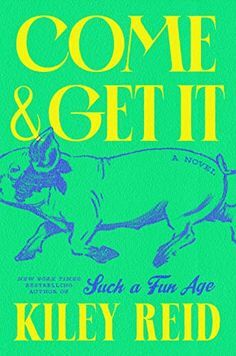
Once again, Kiley Reid writes a witty, vivid, fun and insightful novel about issues of class, race, and power imbalances between women. As in Such a Fun Age, this novel is essentially about a relationship between an older, more financially stable white woman and a younger Black woman with a more precarious financial situation. In Come and Get It, the backdrop is an American university, where Amanda, a writer, gets a gig as visiting professor while researching a book on young women’s attitudes towards weddings. She quickly forms an alliance with Millie, a personable and ambitious young woman who works as a resident assistant in one of the dorms while finishing her own degree. While the story focuses mainly on Millie’s and Amanda’s relationship, there’s also a fascinating web of other characters, mostly the young women who live in the residence hall. As in her previous book, Reid has a sharp eye for personality and a sharp ear for dialogue. The pacing of the book feels slow at first, like this is just going to be a kind of “slice of life” story where not a lot happens (which honestly would be fine because the voice and characterization are so engaging) but when the plot picks up in the last third of the novel things start to unravel quickly and the book becomes (became for me at least) hard to put down. I think Kiley Reid is one of the best writers chronicling the lives of young American women today. Loved this book.
February 27, 2024
Pompeii, by Robert Harris

After reading Elodie Harper’s The Temple of Fortuna a couple of months ago, I was interested to pick up another novel, from about 20 years ago, also about the eruption of Vesuvius and the destruction of Pompeii. Harris’s novel is much more tightly focused on the disaster itself, covering just the days immediately before and after Vesuvius erupts. The main character is an engineer working on the aqueduct, who starts investigating why water has stopped flowing to some of the towns near Pompeii. As the time ticks away to the disaster that all the readers know is coming but the characters are unaware of, the suspense lies in seeing which of the characters will survive and for those who do, how their lives will be changed. I found this vivid, engaging and informative.
February 6, 2024
Everyone on This Train is a Suspect, by Benjamin Stevenson
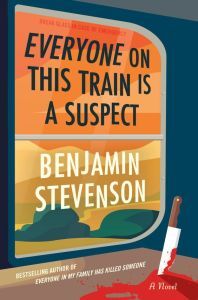
Everyone on This Train is a Suspect continues the main character and premise of Stevenson’s last novel, Everyone in My Family Has Killed Someone. In that book, the hapless Ernest Cunningham, who has never written a mystery novel but has written a series of how-to books instructing other writers on how to construct mysteries, finds himself in the midst of a series of gruesome deaths during a family reunion in a remote ski resort. Having lived through and solved that mystery and written about it in a best-selling book, Ernest is now invited to an exclusive event for mystery writers and fans, held aboard a luxury train crossing Australia from north to south. You won’t be surprised to learn that one of the writers is murdered, or that Ernest tries to solve the mystery and make it the basis for his next book, nor that he repeatedly breaks the fourth wall and discusses with the reader how these (allegedly) real-life events are following the rules of good mystery writing. You won’t be surprised by any of that, but if you liked the first book, you’ll enjoy this journey too.
Murder Your Employer, by Rupert Holmes
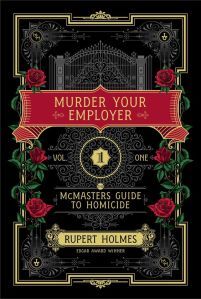
This is … kind of a mystery novel, but also kind of not. There’s no “whodunnit?” here — if anything, it’s a reverse mystery (I’m not sure if that’s a category, but I can think of a few books that fall into this category). We know all along who’s committing the murder(s), and our sympathy is entirely with the murderer rather than the victim — the suspense comes from finding out if they’ll get away with it.
The premise is unique. Somewhere (“where” exactly is a closely guarded secret), in the 1950s, an extremely private school exists – a school whose mandate is to train students in the art of committing perfect, untraceable murders. The caveat is that the murder victims must be people deserving of death — people that not just the would-be killer, but the world as a whole, would be better off without.
The three main characters — an unsuccessful whistleblower who has discovered a fatal flaw in the airplane design his company is working on, a quiet and well-meaning nurse who is being blackmailed by another nurse, and a Hollywood star who’s being forced into inferior roles because she won’t sleep with the studio head — would all like to kill their superiors. And all of them, kin one way or another, get whisked away to the top-secret McMaster institute to perfect their skills. But when they return to their everyday lives, can they actually go through with the deeds?
I found the first part of this book — the actual studying of murder — a bit slow, but the pace and my interest picked up a lot in the second half when the actual murders were being committed. The book is quite light and obviously doesn’t take murder too seriously, but I was intrigued by how it plays with and exaggerates some of the classic mystery-novel tropes — the unlikeable murder victim that nobody really mourns, and the unbelievably clever and complicated murder plot. For a book about getting away with murder, this was quite fun.
Run Towards the Danger, by Sarah Polley
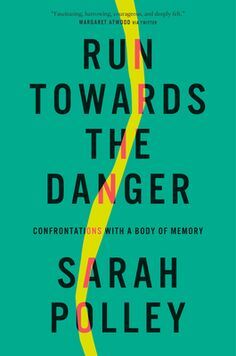
This collection of personal essays by Canadian child actor/grown-up movie director Sarah Polley (to squash her very impressive resume down to the two things she’s likely best known for), is a powerful and thought-provoking read. It’s sort of a memoir, but rather than following a typical “this is the narrative of my life” structure, the book is made up of six separate essays, each about traumatic events in Polley’s life that impacted her both physically and mentally. From scoliosis and stage fright as a child star, to sexual assault and her decision not to go public as one of the victims in a high-profile case, to the aftermath of concussion (and the unorthodox treatment regimen from which the book gets its title), each of these pieces is thoughtful and insightful.
I recorded a podcast recently where a guest and I took a deep dive into discussing this book; I’ll link that here when it’s posted, and until then, I won’t say much more — except that this is far from a typical “celebrity memoir” and well worth reading.
January 21, 2024
Eligible, by Curtis Sittenfeld
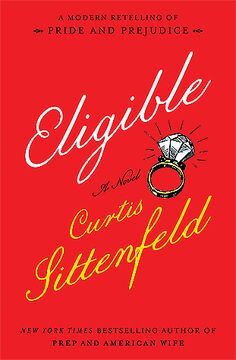
I enjoyed the previous book I read by Curtis Sittenfeld, Romantic Comedy, and I generally enjoy a good alternative take on Jane Austen, so picking up Eligible was an easy choice. In this modern re-telling, the five Bennet sisters are considerably older than they are in Pride and Prejudice, ranging in age from mid-20s to nearly 40. That does make it more noteworthy, even in 21st century American culture, that none of them has married, had kids, or is in any kind of long-term relationship. Only Liz and Jane have flown the next to live on their own, but they return home when Mr. Bennet has a heart attack, to help their hapless mother and sisters through his recovery.
From there, some things unspool as you would expect — sweet Jane meets rich and handsome Chip Bingley; snarky Liz meets aloof and disdainful (and rich) Fitzwilliam Darcy, and various hijinks ensue. Some things are different — there’s a Wickham-esque character, for sure, but he doesn’t play the same role in Lydia’s story — in fact, the crisis that in Pride and Prejudice is triggered by Lydia’s running away with Wickham, plays out very differently here. And, of course, the fact that much of the story of the Bennet family intersects with a dating-reality show called Eligible gives it a distinctly modern flair.
Although I didn’t think this was a perfect book by any means, I did enjoy reading it. One small content warning: there is a transgender character, and the way even our sympathetic heroine Liz speaks and thinks about that character involves using terms and asking questions that would be considered offensive by most trans people. However, the book is set in 2013 and was released in 2016, and I think it’s pretty accurate to how even well-meaning cis people thought and spoke about trans people 10 years ago — and Liz does make an effort to educate herself in the book and recognizes that some of her words were hurtful and not the right terms to use. Still, it’s a bit jarring to pick up and read today and realize how much attitudes have changed in a decade. Apart from that one caveat, this is a fun, light romp through a modern re-imagining of Austen.
Stone Blind, by Natalie Haynes
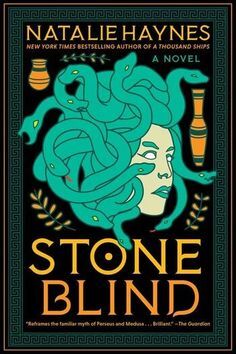
Natalie Haynes’s A Thousand Ships was a favourite book of mine back in 2021, and I couldn’t wait to read her latest woman-centred take on Greek mythology. Another parallel here is to Madeline Miller’s Circe, where a “monstrous” woman from myth is centred in the story to provide a different perspective. Stone Blind tells the story of Medusa from the perspective of Medusa herself and her Gorgon sisters, but also tells the story of her killer Perseus, of the goddess Athena who aids him, and of Andromeda, daughter of Cassiope, who is destined to be rescued by Perseus and marry him. As with Haynes’s earlier work, there’s plenty of wry humour and a critical assessment of the male “heroes” of these myths. While I didn’t find this quite as funny as A Thousand Ships, I did find this an engaging take on the tale of Medusa, and greatly enjoyed it.
The Rachel Incident, by Caroline O’Donoghue
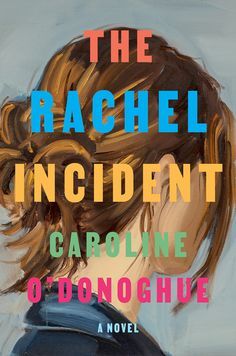
Having read a few Sally Rooney books, I might have been predisposed to think that a novel by a young female Irish writer about a complicated web of relationships among young Irish people in the early 2010s would be written in an impeccably correct but bloodless and humourless style that screamed “IMPORTANT LITERARY FICTION” while failing to make me care much about the characters and their relationships. (O’Donoghue’s writing has been compared to Rooney’s highly acclaimed work). Expecting that, I likely wouldn’t have picked it up.
However, I am a devotee of O’Donoghue’s smart, funny podcast Sentimental Garbage and I was relatively sure that her literal voice — vivid, wry, funny, bursting with life and energy — as I’ve heard it in so many podcast episodes, would translate to her literary voice, so that this novel would not just be an insightful examination of a slice of life at a specific place and time, but would also be actually, you know, fun to read. And wow, was it ever.
Rachel, the narrator, and her gay-but-not-out best friend James, burst off the page like real, flesh-and-blood people — probably because, as O’Donoghue has confirmed in a number of interviews, they are very closely based on herself and her own gay-but-not-out-at-the-time best friend with whom she shared a flat in Cork while finishing university. The dramatic twists and turns of the plot — the affairs, betrayals, and heartbreak that propel this novel’s page-turning energy — are fictional, but the sense that they are happening to real people, brought to life by a novelist with a rich and unforgettable voice, is unmistakable.
It would be remiss to mention that this is also an “issue” book, as the question of Irish women’s lack of access to abortion prior to 2018 is pivotal to the plot. However, as the best novels do, The Rachel Incident tackles heavy issues in ways that feel serious and respectful, without making reading the book in anyway a heavy or depressing experience. I loved this novel and wish more people knew about it.



